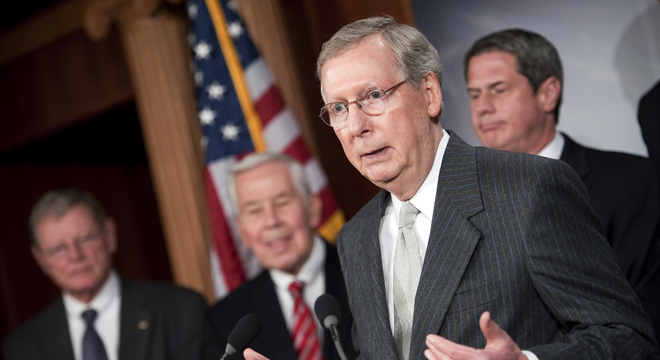If Republicans win the White House and narrow majorities in Congress they’ll face a dilemma: Should we fast-track the sweeping policy changes to popular social programs we voted for in recent Republican budgets? Or should we bide our time until the public provides us with a once-in-a-generation mandate?
Recent comments by the Senate’s highest ranking Republican and one of his conservative adversaries suggest the GOP hasn’t settled on a victory strategy, and that a big win in November would prefigure a contentious debate within the party.
“[T]he American people have never given us the kind of hammerlock on Congress that Democrats had during the New Deal, that they had during the Great Society, and that they had in 2009 and 2010,” Senate Minority Leader Mitch McConnell (R-KY) lamented on WHAS in Kentucky Tuesday morning.
McConnell noted that for a century now Republicans haven’t enjoyed a Senate majority larger than 55 votes, which explains why they haven’t been able to lock in the controversial reforms they’ve called for since Social Security and Medicare became law.
“I think your point was, Why haven’t you been able to get better results?” McConnell scolded. “And I think the answer to that is, We haven’t had enough votes. We have elections in this country and the winners get to make policy and the losers go home. And the Democrats have had Congress, sometimes with whopping majorities, most of the time since the New Deal. And that’s a great disappointment — I think that’s the reason the country has the kind of debt and deficit that it has, because we’ve not been able to secure the support of enough of the American people to have the kind of big majorities you need to kind of roll things back. Maybe some day we’ll have that. I hope so.”
Â
Â
Â
Â
In other words, just wait until we have a filibuster-proof majority and then we’ll make our move. It explains, by implication, why Republicans didn’t do more when George W. Bush was president to cut or phase out safety net programs through the filibuster-proof budget process.
But if Republicans take over Congress and the White House next year, even with thin majorities, conservatives will be clamoring to streamline major changes to popular programs like Social Security and Medicare anyhow.
“If we get the [Senate] majority and the White House, we have got to pass a budget that sets up the structure, through reconciliation, to repeal Obamacare by killing the mandate,” Sen. Jim DeMint (R-SC) told the conservative National Review last week. He also wants to “totally redo our tax code,” put “Medicare on a sustainable course,” and “deal with Social Security.” But should Republicans win then stumble, “it’d be betrayal to our country.”
“We need to do it in the first 100 days,” DeMint says. “[Mitt] Romney has told me, face to face, that he knows that he needs to get these things done right away. He is looking at this as a one-term proposition.”
DeMint’s hopes that an influx of conservative senators next year will force McConnell and other GOP leaders out of what he calls a “business-as-usual rut.” That’s the right’s last best hope to muscle through the sorts of policies — Medicare privatization, Medicaid block grants — they’ve staked out for years. But it won’t happen unless DeMint and his allies win a big struggle within the Republican party first.










